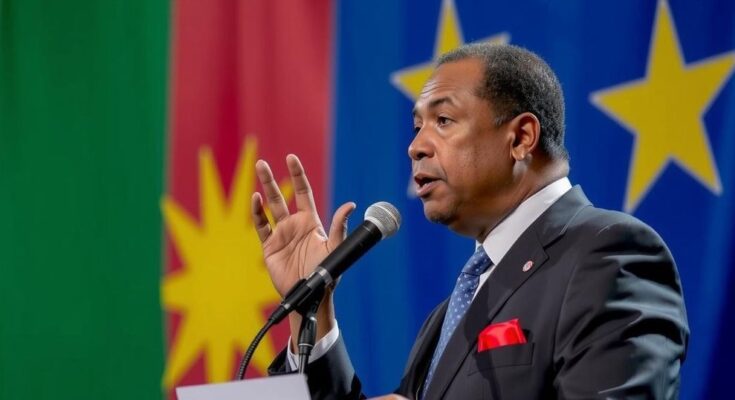Mauritius Prime Minister Pravind Jugnauth conceded defeat in the legislative elections, allowing opposition leader Navin Ramgoolam to potentially reclaim his role as prime minister. The election was overshadowed by a wire-tapping scandal, raising concerns over governance and civil liberties. Both camps promised reforms to address economic hardships facing the populace, as the nation anticipates the official election results.
On Monday, Prime Minister Pravind Jugnauth acknowledged a significant defeat for his coalition in the contentious legislative elections, thus clearing the way for the opposition to assume power. While the final results from the voting took place on Sunday are yet to be published, opposition leader Navin Ramgoolam appears poised to reclaim his position as prime minister at the helm of the Alliance of Change. Jugnauth expressed that the electorate had made a definitive choice, stating, “The people have chosen another team to lead the country” and extending well wishes to the incoming administration.
The anticipation for results is exacerbated by delays in counting, attributed to certain election day occurrences. In Mauritius, a nation known for its political stability, the winner-takes-all electoral model significantly impacts the functioning of its 70-seat National Assembly, amidst which sixty-two seats were contested in this election cycle.
Despite previous celebrations of a historic pact with Britain concerning the Chagos Islands, the recent elections have been marred by a wire-tapping scandal that implicated government figures in the compromising of civil liberties. The opposition’s campaign promised to alleviate various societal issues, particularly addressing the rising cost of living and reforming the electoral process.
Both Jugnauth and Ramgoolam hail from established political families that have significantly influenced Mauritius since its independence. Ramgoolam had predicted victory for his bloc, declaring, “We are heading towards a big victory… The people are waiting for this liberation.” The promise of continuing governance is weighed against the backdrop of governance concerns and allegations of corruption, particularly as the nation strives for economic growth and stability in a post-colonial context.
Mauritius, a nation renowned for its political stability and economic prosperity, has historically maintained a multi-party democracy since gaining independence from Britain in 1968. The recent elections reflect a pivotal moment in Mauritian politics, as they came amidst controversy roused by a wire-tapping scandal that raised questions about civil liberties. The structure of governance, characterized by a winner-takes-all model, has been both instrumental in shaping its parliamentary landscape and contentious in terms of electoral fairness. The political dynasties of Jugnauth and Ramgoolam symbolize enduring legacies that continue to impact the country’s political discourse.
The recent electoral defeat conceded by Prime Minister Pravind Jugnauth marks a significant transition in Mauritian politics, facilitating the potential return of opposition leader Navin Ramgoolam. The election has highlighted societal issues, including governance concerns and allegations of corruption, prompting calls for reform and responsible leadership as the nation moves forward. The incoming administration is now tasked with addressing the expectations of the electorate in light of prevailing economic challenges.
Original Source: www.bellevueheraldleader.com




